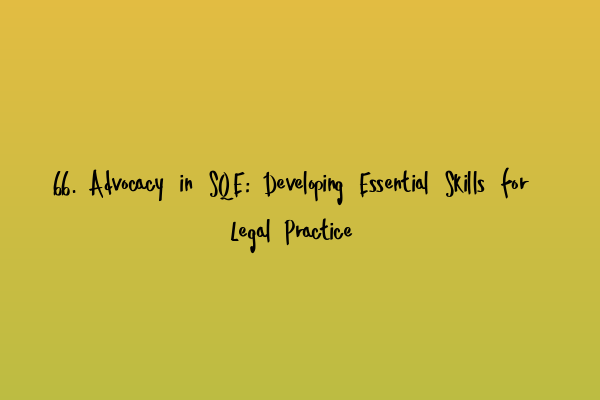**66. Advocacy in SQE: Developing Essential Skills for Legal Practice**
As the newly implemented Solicitors Qualifying Examination (SQE) takes center stage in the legal profession, law graduates and professionals alike are compelled to adapt to the changing landscape. Advocacy, a fundamental skill for any successful lawyer, plays a crucial role in legal practice. In this article, we will explore the importance of advocacy in the SQE and discuss how to develop the essential skills needed to excel in this area.
Advocacy, simply put, involves the act of presenting a case or argument before a court or tribunal. It encompasses oral skills such as persuasive speaking, effective communication, and the ability to analyze and present complex legal issues. In the context of the SQE, advocacy is one of the skills assessed in both SQE1 and SQE2 exams.
To perform well in the advocacy component of the SQE, it is imperative to develop a comprehensive understanding of the relevant legal principles, rules of evidence, and court procedures. This understanding forms the bedrock upon which effective advocacy is built. A solid grasp of substantive law, combined with the ability to apply it to factual scenarios, will enable aspiring solicitors to construct logical and persuasive arguments.
One way to enhance your advocacy skills is to engage in mock advocacy exercises. These simulated scenarios allow you to practice presenting your case before an imaginary judge, opposing counsel, and jury. Mock advocacy exercises provide a safe environment to refine your oral skills, develop your courtroom demeanor, and receive constructive feedback from experienced professionals. Consider enrolling in SQE 1 practice exam questions [^1] for a comprehensive preparation for the advocacy component of the exam.
Furthermore, familiarity with different types of courts, their jurisdictions, and procedures is essential for SQE candidates. Understanding the formalities and etiquette of each court setting is crucial for effective advocacy. By immersing yourself in the intricacies of courtroom dynamics, you will be better equipped to adapt your approach to different legal environments.
The SQE also places significant emphasis on legal writing and drafting skills, which are intertwined with advocacy. Written advocacy is a crucial aspect of legal practice, requiring clarity, precision, and persuasive language to convey complex legal arguments. As an aspiring solicitor, honing your legal writing skills will not only improve your performance in the SQE but also enhance your overall professional competence.
There are various ways to develop your legal writing skills. Reading well-crafted legal opinions and judgments can expose you to the nuances of persuasive writing. Additionally, participating in writing workshops and seeking feedback from experienced legal professionals can help you refine your written advocacy skills. For practice mocks and FLK1 FLK2 exams, SQE 1 preparation courses [^2] offered by reputable institutions can provide thorough guidance.
In the age of digitalization, it is essential for aspiring solicitors to understand the role of Search Engine Optimization (SEO) in legal practice. SEO is a strategy used to increase the visibility and online presence of a website or online content. By integrating relevant keywords and applying SEO techniques, legal professionals can enhance their online reputation and attract a wider audience.
Integrating relevant keywords throughout your online content allows search engines to understand the relevance and importance of your material, thereby improving its search rankings. When writing about advocacy in the SQE, you can strategically use keywords such as “SQE advocacy,” “SQE preparation,” and “advocacy skills for solicitors” to optimize your content. This technique ensures that your article reaches a wider audience and increases your chances of attracting potential clients or employers in the legal field.
To maintain professional integrity and credibility, it is important to strike a balance between SEO optimization and providing valuable, informative content. Remember, the goal is to engage readers through well-crafted, informative articles rather than using SEO solely for the purpose of ranking higher in search engine results.
In conclusion, advocacy is an essential skill that aspiring solicitors must develop to succeed in the SQE and legal practice. By focusing on comprehensive legal understanding, engaging in mock advocacy exercises, honing written advocacy skills, and incorporating SEO techniques appropriately, law graduates can position themselves for success in this evolving legal landscape. By investing time and effort in developing advocacy skills, you will not only enhance your performance in the SQE but also lay a solid foundation for a successful career in the legal profession.
***Related Articles:***
– [SQE 1 Practice Exam Questions](https://fqps.co.uk/sqe/sqe1-preparation/mcq-practice-quiz)
– [SQE 1 Practice Mocks FLK1 FLK2](https://fqps.co.uk/sqe/sqe1-preparation/practice-mocks-quiz)
– [SQE 2 Preparation Courses](https://fqps.co.uk/sqe/sqe2-preparation)
– [SQE 1 Preparation Courses](https://fqps.co.uk/sqe/sqe1-preparation)
– [SRA SQE Exam Dates](https://fqps.co.uk/sqe/sqe1-sqe2-exam-dates)
